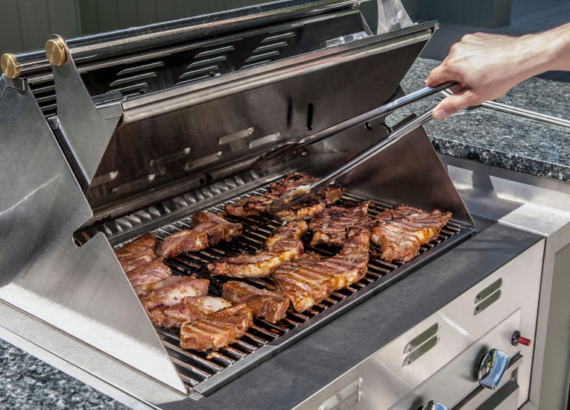Is a gas or electric stove better for the environment?

With so many different types of stoves on the market today, it can be hard to choose which one is best for in your kitchen.
One of the most important considerations is their impact on the environment. Many homeowners wonder: is a gas or electric stove better for the environment?
An electric stove is better for the environment than a gas stove. Unlike electric stoves, gas stoves produce carbon monoxide, nitrogen dioxide, and formaldehyde. These compounds are harmful to the environment and your health.
According to the EPA, indoor air is about two to five times more polluted than outdoor air. Contaminants from gas stoves are one of the driving factors of this pollution.
Here’s a little more information on each of the main pollutants from gas stoves if you’re interested.
Table of Contents
Nitrogen Dioxide
Nitrogen dioxide is a greenhouse gas that exacerbates climate change when it travels into the atmosphere. It’s made up of small particles called particulate matter that are dangerous to your health.
Homes with gas stoves produce up to 400% more nitrogen dioxide than homes with electric stoves, according to the Rocky Mountain Institute.
Too much nitrogen dioxide in the atmosphere can lead to acid rain which is especially harmful to forests.
Carbon Monoxide
Carbon monoxide (CO) doesn’t directly contribute to global warming. But when it gets in the atmosphere it prolongs the life of other greenhouse gases, contributing to climate change.
CO is also hazardous to your health, even in small concentrations. That’s why many homes are required to have carbon monoxide detectors.
Too much carbon monoxide can cause carbon monoxide poisoning. This reduces the flow of oxygen to the brain, which can lead to symptoms ranging from disorientation to death.
Formaldehyde
Formaldehyde (CH2O) is made up of hydrogen, oxygen, and carbon. In the atmosphere it can break down into carbon monoxide, accelerating climate change.
While it’s good to know about the environmental impact of your stove, you might have other questions.
Do I want a gas or electric stove? What are the pros and cons of each one? Are gas stoves safe? Is it cheaper to use a gas or electric stove? The list goes on…
We’ll answer these questions and more so you can make an informed decision on which stove is right for you.
Let’s start with the pros and cons.
Gas Stove Pros
- Doesn’t take time to warm up
- Can change the heat intensity immediately
- Preheats faster than an electric oven
- Cooks your food more evenly than an electric stove
- Allows you to cook a wide variety of food
- Great for grilling, frying, and Asian cooking
- Works even when your power is out
- Cost-effective
Gas Stove Cons
- Requires gas line installation
- Can be dangerous if the gas is left on
- Older gas stoves may have a pilot light that has to be lit all the time
- Sometimes the burner won’t light
- Produces harmful contaminants such as carbon monoxide and formaldehyde
- Difficult to clean thanks to grill grates and burner covers
Electric Stove Pros
- Doesn’t produce as much heat as a gas stove
- Easier to clean than a gas stove
- Doesn’t get as hot as a gas stove
- Not ideal for constant frying, grilling, or Asian cooking
- Doesn’t require a gas supply
- Easy to install – most homes can accommodate electric stoves
- Easy to power on and off
- Not as expensive to install as gas stoves
Electric Stove Cons
- Can burn yourself easy; you can’t always tell if it’s on by looking at the coils
- Can’t use when the power goes on
- New electric stoves can be quite pricey
- Use about three times as much energy as a gas stove
- Can be quite expensive over time due to high energy consumption
- If the power goes out, so does the stove
- Doesn’t heat as evenly as a gas stove
Is a gas stove safe?
Gas stoves are incredibly safe as long as you have adequate ventilation in your home. We recommend purchasing a range hood over your gas stove. It will vent out the harmful contaminants as well as grease and smoke from your kitchen.
Be sure to turn your gas stove off completely after use. If it’s left on for too long, this can be a fire hazard or lead to severe health issues.
Do gas stoves cause cancer?
The cancer risk is incredibly low when running a gas stove. Gas stoves produce the carcinogen benzene, but not enough of it to be dangerous. Still, it’s important to vent contaminants to the outside with a professional range hood.
Is it cheaper to use a gas stove or electric?
In the long term, it’s cheaper to use a gas stove. Gas stoves might cost more to purchase and install, but they are much less expensive in the long term than electric stoves. It costs about three times as much to run an electric stove.
If you don’t cook often, you won’t notice a massive difference in the cost. But if you cook every day or multiple times a day, a gas stove is a smart long-term investment.
Which is better: cooking with gas or electricity?
The answer to this question will be different for everyone. Gas ranges and electric ranges have unique pros and cons.
Generally, if you cook often and can afford to install a gas line, a gas range is the way to go. But it’s important to have great ventilation in your home like a range hood. If you don’t cook often and want to be more environmentally friendly, an electric stove is your best bet. But it will cost more over time than running a gas stove.
We hope you found your answer to ‘Is a gas or electric stove better for the environment?’ All in all, electric stoves are better for the environment.
If you’re wondering which stove is right for you, there is no “one size fits all” answer. But we hope this guides you to the right decision based on your kitchen setup and cooking habits.
Thanks for reading! If you liked this article, check out more below!
Related Articles
Can you leave a kitchen exhaust fan on?
7 Quietest Range Hoods of 2022
12 Tips to Get Rid of Cooking Smells in Your Home
Is a gas or electric stove better for the environment?
An electric stove is better for the environment than a gas stove. Unlike electric stoves, gas stoves produce carbon monoxide, nitrogen dioxide, and formaldehyde. These compounds are harmful to the environment and your health.
According to the EPA, indoor air is about two to five times more polluted than outdoor air. Contaminants from gas stoves are one of the driving factors of this pollution.
Is a gas stove safe?
Gas stoves are incredibly safe as long as you have adequate ventilation in your home. We recommend purchasing a range hood over your gas stove. It will vent out the harmful contaminants as well as grease and smoke from your kitchen.
Be sure to turn your gas stove off completely after use. If it’s left on for too long, this can be a fire hazard or lead to severe health issues.
Do gas stoves cause cancer?
The cancer risk is incredibly low when running a gas stove. Gas stoves produce the carcinogen benzene, but not enough of it to be dangerous. Still, it’s important to vent contaminants to the outside with a professional range hood.
Is it cheaper to use a gas stove or electric?
In the long term, it’s cheaper to use a gas stove. Gas stoves might cost more to purchase and install, but they are much less expensive in the long term than electric stoves. It costs about three times as much to run an electric stove.
If you don’t cook often, you won’t notice a massive difference in the cost. But if you cook every day or multiple times a day, a gas stove is a smart long-term investment.
Which is better: cooking with gas or electricity?
The answer to this question will be different for everyone. Gas ranges and electric ranges have unique pros and cons.
Generally, if you cook often and can afford to install a gas line, a gas range is the way to go. But it’s important to have great ventilation in your home like a range hood. If you don’t cook often and want to be more environmentally friendly, an electric stove is your best bet. But it will cost more over time than running a gas stove.







Comments are closed.